
CREDIT: DEUTSCHE WELLE SCREEN GRAB
The conventional wisdom that the new geopolitical competition will not spread to the global South, as it did during the first Cold War, is wrong, at least when it comes to Africa, argues Brett L. Carter, an Assistant Professor at the University of Southern California and a Fellow at Stanford University’s Hoover Institution.
Africa’s dictators will choose Beijing and Moscow because such partnership serves their domestic interests. Africa’s democracies will be torn, he writes for Foreign Affairs:

National Endowment for Democracy (NED)
Some leaders will ally with Beijing and Moscow in the hope of solidifying their power. Others will straddle the divide, seeking aid, debt relief, and investment from both the United States and its adversaries. Whereas the post–Cold War world witnessed a historic expansion of democracy that catalyzed an economic takeoff, the second cold war will see democratic backsliding.
China is especially energetic in promoting its “sharp power” in the Global South.
The Chinese government flies African journalists to China, escorts them to tour infrastructure projects, and teaches “how to report from the Chinese government’s perspective,” according to Christopher Walker, an executive at the National Endowment for Democracy (NED).







